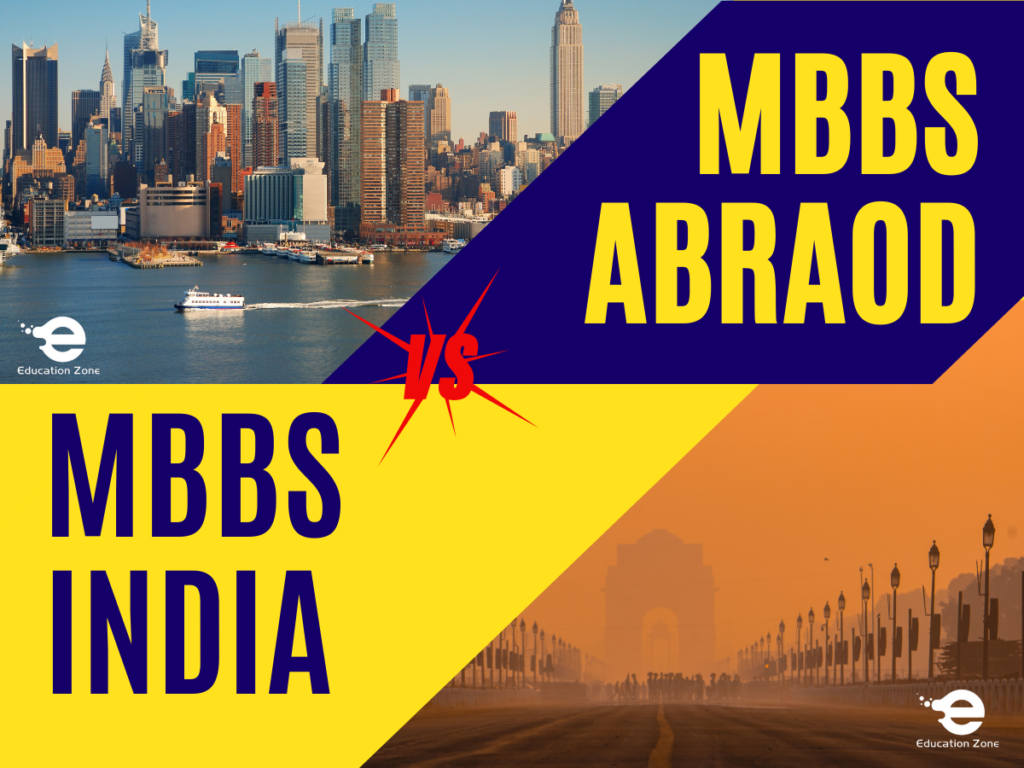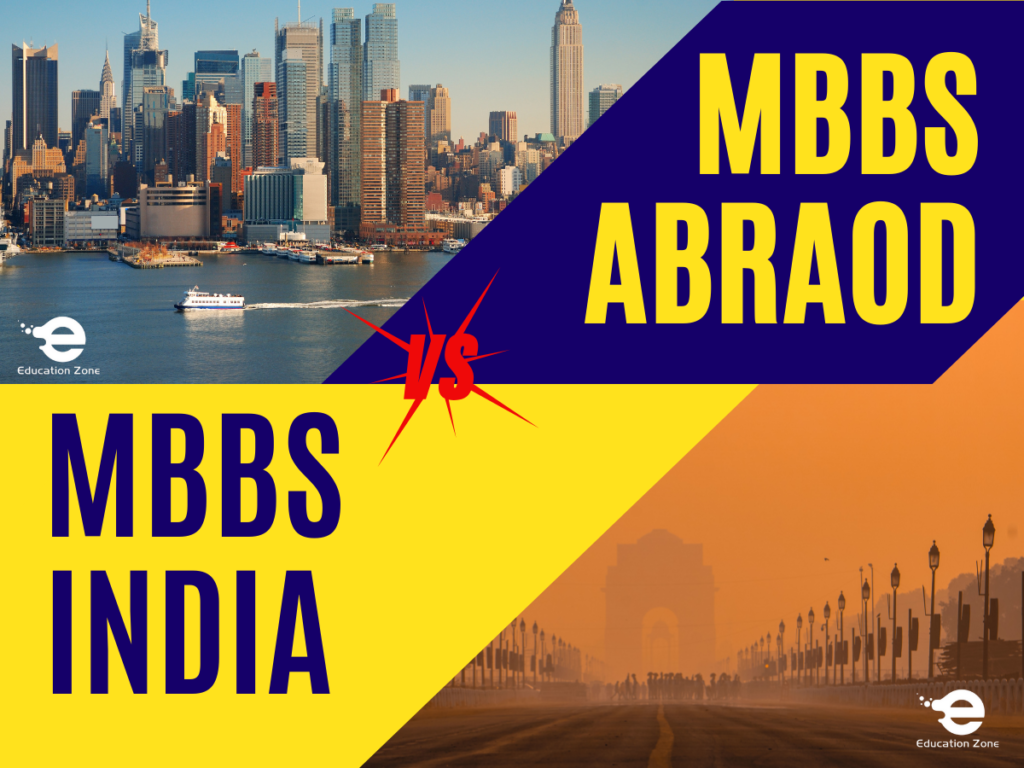MBBS Abroad vs. MBBS in India: Comparison

Explore MBBS Abroad vs. MBBS in India to make informed decisions about your medical education journey

1. Cost:
MBBS Abroad:
- Tuition Fees:
- Vary depending on the country and institution.
- Additionally, scholarships and financial aid may be available to alleviate costs.
- Living Expenses:
- Furthermore, living expenses can be higher abroad due to accommodation, food, and other daily expenses.
MBBS in India:
- Government Colleges:
- In contrast, government colleges offer subsidized tuition fees, making education more accessible.
- Private Colleges:
- Conversely, private colleges may have higher fees, impacting the overall cost of education.
- Living Expenses:
- Similar to abroad, living expenses vary depending on the city and lifestyle.
2. Quality of Education:
MBBS Abroad:
- Country and Institution:
- Quality depends on accreditation standards; however, institutions in countries like the US, UK, Australia, and Canada are renowned for their high standards.
- Advanced Facilities:
- Furthermore, advanced facilities and innovative teaching methods contribute to the quality of education in many foreign institutions.
MBBS in India:
- Government vs. Private Colleges:
- While government colleges are esteemed, the quality among institutions may vary; likewise, private colleges also offer modern facilities and infrastructure.
- Accreditation:
- Nonetheless, accreditation by the Medical Council of India ensures a certain level of quality across Indian medical colleges.
3. Recognition:
MBBS Abroad:
- Global Recognition:
- Despite this, MBBS degrees obtained abroad are generally recognized internationally; however, additional requirements may be necessary for specific countries.
MBBS in India:
- National Recognition:
- On the contrary, degrees obtained from Indian medical colleges are recognized nationally; however, the process for international recognition varies.
4. Competition:
MBBS Abroad:
- Admission Process:
- Although competitive, the admission process may be less intense compared to India, offering opportunities for students.
MBBS in India:
- Entrance Exams:
- Conversely, entrance exams for government medical colleges in India, such as NEET, are highly competitive due to limited seats and a large number of applicants.
5. Language:
MBBS Abroad:
- English Medium:
- Furthermore, many programs abroad are available in English, providing accessibility to international students.
MBBS in India:
- English Instruction:
- Similarly, the medium of instruction in most Indian medical colleges is English, minimizing language barriers for students.
6. Residency and Licensing:
MBBS Abroad:
- Additional Requirements:
- Additionally, graduates may need to complete residency programs and licensing exams specific to the country of practice.
MBBS in India:
- Internship and NEXT Exam:
- In contrast, graduates in India must complete a one-year rotating internship and pass the NEXT exam for licensing.
7. Clinical Exposure:
MBBS Abroad:
- Diverse Settings:
- Moreover, studying abroad provides exposure to diverse healthcare systems and medical practices, enriching students’ experiences.
MBBS in India:
- Varied Population:
- Similarly, Indian medical colleges offer diverse clinical exposure due to the country’s large and varied population.
8. Cultural Experience:
MBBS Abroad:
- Immersion:
- Furthermore, studying abroad offers a unique cultural immersion, fostering cross-cultural understanding and communication skills.
MBBS in India:
- Local Culture:
- Conversely, studying in India provides familiarity with the local culture and customs, facilitating seamless integration into the healthcare system.
9. Career Prospects:
MBBS Abroad:
- Global Practice:
- Subsequently, graduates have the opportunity for global practice; however, navigating different licensing requirements may be necessary.
MBBS in India:
- Diverse Paths:
- Conversely, various career paths are available within India, including specialization options through postgraduate courses and residency programs

Certainly! Let’s expand on each aspect to provide more detailed information:
| Aspect | MBBS Abroad | MBBS in India |
|---|---|---|
| Cost | Tuition fees may vary depending on the country and institution; scholarships and financial aid may be available to offset costs; living expenses can be higher due to accommodation, food, and other daily expenses | Government medical colleges in India typically offer subsidized tuition fees, making it more affordable for students; private medical colleges may have higher fees; living expenses vary depending on the city and lifestyle |
| Quality of Education | Quality of education depends on the country, institution, and accreditation standards; some countries, such as the United States, the United Kingdom, Australia, and Canada, are known for their high-quality medical education with advanced facilities, research opportunities, and innovative teaching methods | India has a mix of government and private medical colleges; while some government colleges are renowned for their quality education, private colleges also offer modern facilities and infrastructure; the Medical Council of India (MCI) accredits medical colleges in India |
| Recognition | MBBS degrees obtained abroad are generally recognized globally, allowing graduates to practice medicine in various countries; however, graduates may need to fulfill additional requirements, such as licensing exams or clinical training, to practice in certain countries | MBBS degrees obtained from Indian medical colleges are recognized within India and by many other countries; graduates may need to pass licensing exams or fulfill other requirements for international recognition, depending on the country’s regulations |
| Competition | Admission to MBBS programs abroad can be competitive, but in some cases, there may be less intense competition compared to India, especially for government medical colleges; admission requirements typically include academic qualifications, language proficiency tests, and sometimes entrance exams | Entrance exams for government medical colleges in India, such as the NEET (National Eligibility cum Entrance Test), are highly competitive due to limited seats and a large number of applicants; private medical colleges may have separate entrance exams or merit-based admissions |
| Language | Many countries offer MBBS programs in English, making it accessible to international students; however, students may need to demonstrate English language proficiency through tests such as the TOEFL (Test of English as a Foreign Language) or IELTS (International English Language Testing System) | The medium of instruction in most Indian medical colleges is English, reducing language barriers for English-speaking students; however, students from non-English speaking backgrounds may need to improve their language skills |
| Residency and Licensing | Graduates from MBBS programs abroad may need to complete additional steps, such as residency programs and licensing exams, to practice medicine in their desired country; requirements vary by country and may include examinations, clinical training, and language proficiency tests | In India, medical graduates need to complete a one-year rotating internship and pass the NEXT (National Exit Test) exam to obtain a medical license; residency programs are available in various specialties for further training |
| Clinical Exposure | Studying MBBS abroad provides exposure to diverse healthcare systems, medical practices, and cultural experiences; students may have opportunities for international clinical rotations or electives, gaining insight into different medical specialties and patient populations | Indian medical colleges offer diverse clinical exposure due to the country’s large and varied population; students have opportunities to work in hospitals, clinics, and community settings, gaining hands-on experience in various medical specialties |
| Cultural Experience | Studying MBBS abroad offers a unique cultural experience, allowing students to immerse themselves in different cultures, languages, and lifestyles; adapting to a new environment can broaden perspectives and enhance cross-cultural communication skills | Studying MBBS in India provides students with familiarity with the local culture, customs, and healthcare practices; students interact with patients from diverse backgrounds, gaining insights into the social determinants of health and cultural sensitivity |
| Career Prospects | Graduates from MBBS programs abroad have opportunities to practice medicine globally, but they may need to navigate different licensing requirements and healthcare systems; some countries have specific pathways for international medical graduates (IMGs) | Medical graduates in India can pursue various career paths, including clinical practice, research, academia, public health, and healthcare administration; opportunities for specialization and further training are available through postgraduate courses and residency programs |
Explore MBBS Abroad vs. MBBS in India to make informed decisions about your medical education journey



